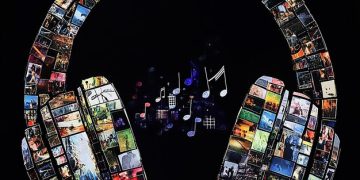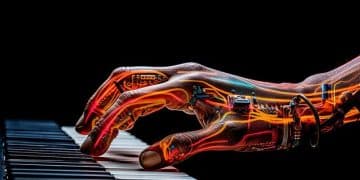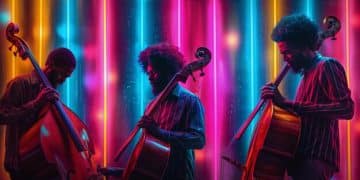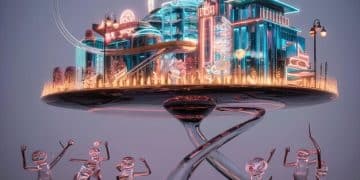The Impact of AI on Music Production: Will Pop Music Ever Be the Same?
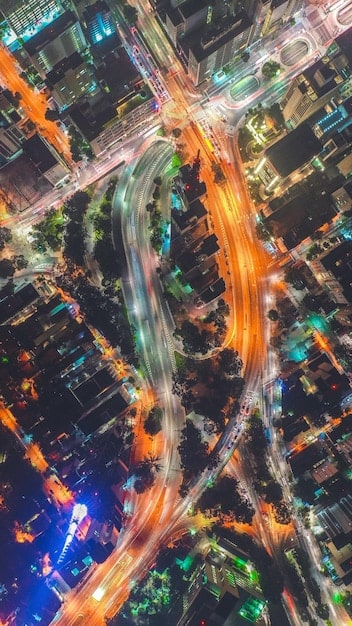
The Impact of AI on Music Production is transforming pop music by assisting with composition, mastering, and even creating entirely new tracks, raising questions about authenticity and artistic control.
The rise of artificial intelligence is not just a technological advancement; it’s a cultural phenomenon that’s rapidly changing various sectors. One significant area being reshaped is the music industry. The impact of AI on music production is already evident, particularly in how it’s influencing the sound of pop music.
The AI Revolution in Music: An Overview
Artificial intelligence is no longer a concept confined to science fiction. It’s a tangible tool being utilized by musicians, producers, and engineers in the music industry. This technological integration promises to democratize music production, offering accessibility to aspiring artists and efficiency to established professionals. But how deeply will AI influence the creative process, and what does this mean for the future of pop music?
AI as a Creative Partner
One of the most exciting aspects of AI in music is its potential to act as a creative partner. Software powered by AI can generate melodies, harmonies, and rhythms, providing musicians with a starting point for their songs. This can be especially helpful for those facing writer’s block or looking to experiment with new sounds.
AI for Mastering and Mixing
AI is also streamlining the technical aspects of music production, such as mixing and mastering. These AI tools can analyze tracks, adjust levels, and optimize sound quality. This allows musicians to focus more on the artistic side of their work. It makes professional-sounding results attainable even without extensive technical knowledge.
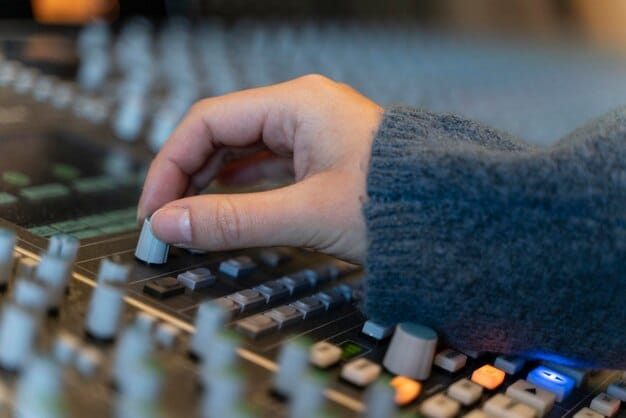
- Improved Efficiency: AI tools can automate repetitive tasks, freeing up time for creative exploration.
- Accessibility: Lowering the barriers to entry for aspiring musicians without formal training.
- New Sounds: Experimentation with AI-generated sounds can lead to innovative musical directions.
In conclusion, Artificial intelligence is impacting Music profoundly, both artistically and technically. While it offers new creative possibilities, it also raises essential questions about the future of musical authenticity in the digital age.
The Evolution of Pop Music: A Historical Perspective
To understand the impact of AI on music production, it’s vital to consider the historical evolution of pop music. Pop, by its very nature, has always been a genre that adapts to technological advancements and cultural shifts. From the introduction of electric guitars to the advent of synthesizers, technology has consistently shaped the sound of popular music.
Early Technological Influences
In the mid-20th century, the introduction of electric instruments revolutionized the sound of pop music. Electric guitars amplified the raw energy of rock and roll. The electric organ added a new dimension to gospel and soul music. These technological innovations paved the way for further experimentation and evolution.
The Synthesizer Era
The arrival of synthesizers in the 1970s dramatically altered the sonic landscape of pop. Artists began experimenting with these new instruments, creating unique sounds and textures. Synth-pop bands emerged, pushing the boundaries of what pop music could be. Synthesis introduced complex soundscapes that were previously impossible.

- Adaptability: Pop music’s enduring strength lies in its ability to adapt to new technologies and trends.
- Innovation: Technological advancements have always been a catalyst for innovation in pop music.
- Democratization: New tools have often made music production more accessible to a wider range of artists.
Understanding how technology has previously shaped pop music provides a valuable context for evaluating the potential impact of AI. As AI tools become more sophisticated, it’s anticipated that they will drive even more significant shifts in the genre’s sound and creative processes.
AI Tools Reshaping Music Production
The range of AI tools available to musicians and producers is broad. These tools can tackle various aspects of music creation. From generating initial song ideas, to refining the final master, AI is offering solutions that were once the realm of human expertise.
Composition and Arrangement Tools
Software like Amper Music and OpenAI’s MuseNet are designed to generate original compositions based on user-defined parameters such as genre, tempo, and mood. These tools make unique starting points for songs. Musicians can then refine what AI provides to fit their vision.
Mixing and Mastering Plugins
iZotope’s Ozone and LANDR provide AI-powered mixing and mastering services. These plugins analyze audio and automatically adjust settings such as EQ, compression, and stereo imaging. This ensures a polished and professional sound. This also saves time and resources compared to traditional methods.
This includes tools to remove noise, repair pitch, and to adjust timing to perfection. This helps to create polished tracks and enhance existing recordings.
- Accessibility: Even novice musicians can create professional-sounding tracks.
- Experimentation: AI tools encourage experimentation by quickly generating variations and ideas.
- Efficiency: AI automates tedious tasks, allowing artists to focus on creativity.
These AI tools are not just about automation. They’re about empowering musicians and opening new avenues for creative expression. The integration of AI promises to revolutionize music production. It also democratizes the process for artists of all levels.
The Debate: Authenticity vs. Innovation
The Impact of AI on Music Production sparks debate about cultural values. The debate is particularly sensitive about what constitutes authenticity in music, especially when algorithms contribute significantly to the creative process. This is a conversation that has been had before, from drum machines to autotune. But the question of the role of AI will dominate industry discussion in the coming years.
The Purist Argument
Some argue that music created with AI lacks the emotional depth and human touch inherent in traditionally composed music. The human element is missing when algorithms dictate the creative process, resulting in a loss of authenticity. This belief holds value on the hard work and years of practice to master performance.
The Progressive View
Others argue that AI is simply another tool that can be used to enhance creativity. By partnering with AI, musicians can explore new sonic territories and push the boundaries of what’s possible. This view sees AI as a catalyst for innovation, rather than a threat to authenticity.
These issues go beyond the music industry. The questions on authenticity, what is unique or genuine, also involve discussions of ethics, copyright protections and the true spirit of artistry.
- Subjectivity: Defining authenticity in music is subjective because it varies widely from person to person.
- Collaboration: AI can be viewed as a collaborator, working alongside human artists to create something new.
- Evolution: Music has always evolved through technological advancements, and AI is a natural progression.
The debate between authenticity and innovation highlights the complex relationship between technology and art. As AI becomes more integrated into music production, it’s likely that these discussions will become even more nuanced and relevant.
How AI Could Influence the Sound of Pop Music
Given its capabilities, AI has the potential to drastically alter the sound of pop music in several ways. From more complex arrangements to an increased variety of instrumentation, AI can push the boundaries of creativity and production.
Increased Complexity
AI can generate complex rhythmic patterns, melodic structures, and harmonic progressions that might be difficult for humans to conceive. This could lead to pop songs with increased complexity and sophistication.
Hybrid Sounds
AI can also be used to blend disparate genres and styles. This opens the door to hybrid sounds that blur the lines between pop, electronic, hip-hop, and other genres. It results in truly unique and innovative musical experiences.
AI can potentially analyze trends and predict what sounds would appeal to that listener. These algorithms can also be utilized to compose songs with a high probability of commercial success.
- Personalization: AI could enable highly personalized music experiences tailored to individual listeners.
- Efficiency: Streamlining aspects of music production and allowing faster song creation.
- Unexpected: By introducing unexpected sounds and structures, AI can push pop music in unforeseen directions.
The influence of AI on the sound of pop music is likely to be profound. It can lead to music that is both more complex and more personalized. As AI technology continues to develop, the possibilities for musical innovation are virtually endless.
The Ethical and Legal Implications
As AI becomes more prevalent in music production, ethical and legal implications need to be considered. These implications cover a wide range of issues. These issues include copyright infringement, ownership of AI-generated music, and the potential for bias in algorithms.
Copyright Concerns
If an AI generates a song that sounds similar to an existing work, it could raise copyright infringement issues. Determining originality and ownership becomes more complex. Especially when algorithms are involved in the creative process.
Ownership Questions
Who owns the rights to an AI-generated song? The programmer, the user, or the AI itself? These questions have yet to be fully addressed by legal frameworks. It presents challenges for artists and producers using AI tools.
AI’s algorithms are trained on vast datasets of existing music, those datasets may contain biases that are reflected in the music AI produces. This can lead to skewed or unfair results, potentially perpetuating harmful stereotypes.
- Transparency: It’s important for musicians and producers to be transparent about their use of AI in music production.
- Regulation: Clear legal guidelines must be established to address copyright and ownership issues related to AI-generated music.
- Fairness: Developers should work to mitigate bias in AI algorithms to ensure fair and equitable outcomes.
Addressing the ethical and legal implications of AI in music production is essential. Addressing these issues will foster a responsible and sustainable ecosystem. This way AI can be used in ways that benefit both artists and society.
| Key Point | Brief Description |
|---|---|
| 🤖 AI’s Role | AI assists in composition, mixing, and mastering. |
| 🎵 Sound Evolution | AI could lead to more complex and personalized pop music. |
| ⚖️ Ethics & Law | Copyright, ownership, and bias concerns need addressing. |
| 🎨 Authenticity | Debate exists on whether AI music lacks human emotion. |
FAQ
▼
AI is used for various tasks including generating melodies, harmonies. It also helps with mixing, mastering, and suggesting song arrangements.
▼
Examples include Amper Music, iZotope Ozone, LANDR, and OpenAI’s MuseNet. Each offers different capabilities in AI-assisted music creation and production.
▼
Copyright issues can arise if AI-generated music sounds too similar to existing songs. Clear legal guidelines are still needed to address this challenge.
▼
Some argue that AI music lacks emotional depth due to the absence of direct human input. In contrast, others claim that AI is a creative tool that enhances musical innovation and expression.
▼
Ethical considerations include AI algorithm biases, impacts on human musicians’ jobs, lack of transparency in the use of AI music, and cultural representation in songs crafted by AI.
Conclusion
The impact of AI on music production is undeniable, marking a significant shift in how pop music is created and consumed. While concerns about authenticity and legal issues persist, the potential for innovation and accessibility is immense. As AI technology evolves, the music industry will likely see further integration, transforming the sound of pop music in unforeseen ways.
